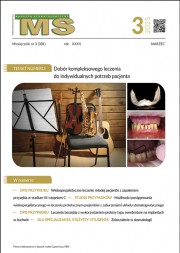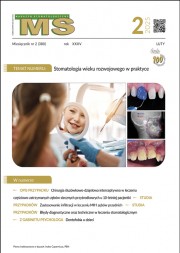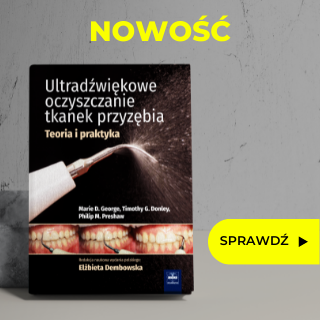Dostęp do tego artykułu jest płatny.
Zapraszamy do zakupu!
Po dokonaniu zakupu artykuł w postaci pliku PDF prześlemy bezpośrednio pod twój adres e-mail.
Aneta Olszewska, Katarzyna Cieślińska, Barbara Biedziak, Jerzy Sokalski
Hasła indeksowe: Calaject, znieczulenia miejscowe, dzieci
The effectiveness of dental procedures in children is very often decided by the ability of carrying them out pain free. The administering of local anaesthetic agents is not infrequently associated with a lot of fear in young patients, as well as discomfort for the dentist carrying out this treatment. This study was evaluated as to the efficacy of treatment and ergonomical use of the Calaject injection apparatus in children.
Piśmiennictwo
- Baier K. i wsp.: Children’s fear and behavior in private pediatric dentistry practices. Pediatr. Dent., 2004, 26, 316-321.
- Haas D.A.: An update on local anesthetics in dentistry. J. Can. Dent. Assoc., 2002, 68, 546-551.
- Wilson S. i wsp.: The effect of electronic dental anesthesia on behavior during local anesthetic injection in the young, sedated dental patients. Pediatr. Dent., 1999, 2, 12-17.
- Saxena P. i wsp.: Advances in dental local anesthesia techniques and devices: an update. Natl. J. Maxillofac. Surg., 2013, 4, 1, 19-24.
- Ashkenazi M. i wsp.: Effectiveness of computerized delivery of intrasulcular anesthetic in primary molars. J. Am. Dent. Assoc., 2005, 136, 1418-1425.
- Nakai Y. i wsp.: Effectiveness of local anesthesia in pediatric dental practice. JADA 2000, 131, 1699-1705.
- Shields B.J. i wsp.: Pediatric pain measurement using a visual analogue scale: a comparison of two teaching methods. Clin. Pediatr., 2003, 42, 227-234.
- Nikolova-Varlinkova K. i wsp.: Reaction of 5 and 6 year old children to local anesthesia during dental treatment. J. IMAB, 2008, book 2, 47-51.
- Maragakis G.M. i wsp.: Reaction of 5 and 6 year olds to dental injection after viewing the Needles: a pilot study. J. Clin. Pediatr. Dent., 2006, 1, 28-31.
- Hadzik J. i wsp.: Calaject – kontrolowane komputerowo znieczulenia miejscowe w stomatologii. Mag. Stomatol., 2015, 3, 75-78.
- Sulka A. i wsp.: Analiza porównawcza subiektywnego odczucia bólu podczas znieczulenia miejscowego aparatem Wand i techniką tradycyjną przy odsłanianiu zatrzymanych kłów górnych. Por. Stomatol., 2009, IX, 2, 48-52.
- Singh P.: An emphasis on the wide usage and important role of local anesthesia in dentistry: a strategic review. Dent. Res. J. (Isfahan), 2012, 9, 2,127-132.
- Kudo M.: Initial injection pressure for dental local anesthesia: effects on pain and anxiety. Anesth. Prog., 2005, 52, 3, 95-101.
- Ram D. i Peretz B.: Administering local anaesthesia to paediatric dental patients – current status and prospects for the future. Int. J. Paediatric Dent., 2002, 12, 80-89.
- Asarch T. i wsp.: Efficacy of a computerized local anesthesia device in pediatric dentistry. Pediatr. Dent., 1999, 21, 421-424.
- Gibson R.S. i wsp.: The Wand vs. traditional injection: a comparison of pain related behaviors. Pediatr. Dent., 2000, 22, 458-462.
- Meechan J.G.: How to overcome failed anesthesia. British Dent. J., 1999, 186, 15-20.
- Pasiek S. i wsp.: Porównanie bolesności wykonania znieczulenia nasiękowego z zastosowaniem strzykawki standardowej i aparatu iniekcyjnego. Stomatol. Współcz., 2001, 8, 2, 39-44.
- Locker D. i wsp.: Age of onset of dental anxiety. J. Dent. Res., 1999, 78, 3, 790-796.














